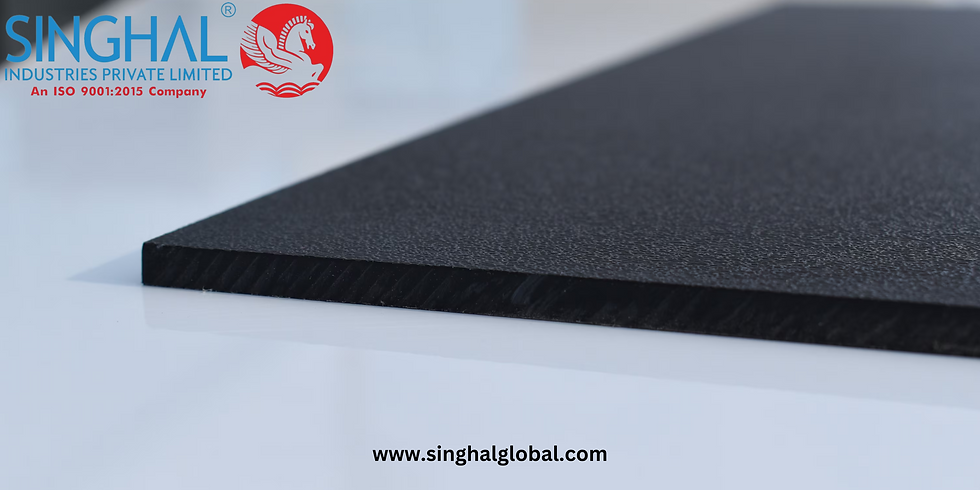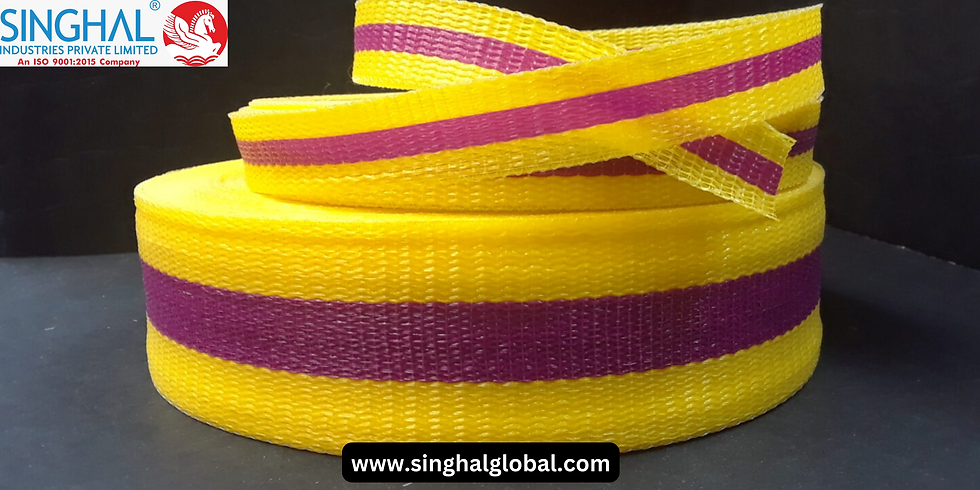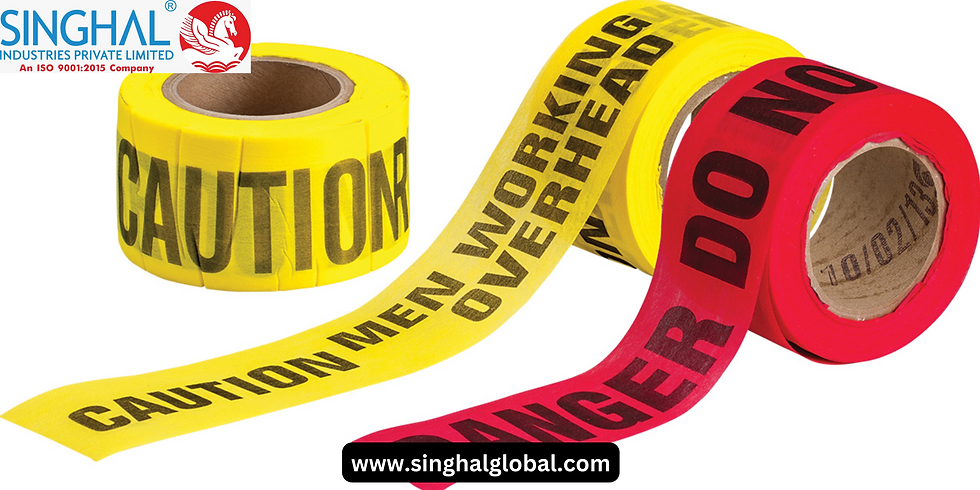Versatility in Plastics: Applications and Advantages of HDPE Bags
- Deepak Karola
- Nov 23, 2023
- 4 min read

In the ever-evolving world of packaging, High-Density Polyethylene (HDPE) bags have emerged as a versatile and reliable solution, offering a wide array of applications across industries. Singhal Industries Pvt Ltd, India's most admired and leading packaging company, is at the forefront of manufacturing HDPE bags. In this blog post, we will explore the diverse applications and advantages of HDPE bags, shedding light on how Singhal Industries continues to set the highest global standards in quality and service.
The Evolution of HDPE Bags
HDPE, a thermoplastic polymer known for its high strength-to-density ratio, has become a staple in the packaging industry. HDPE bags, also known as poly bags, are lightweight, durable, and flexible, making them suitable for a myriad of applications.
Agricultural Sector: HDPE bags play a crucial role in agriculture, especially in the packaging of bulk quantities of seeds, fertilizers, and grains. With options like the popular Plastic bag 50 kg variant, they offer a reliable and cost-effective solution for the storage and transportation of agricultural products.
Retail Packaging: In the retail sector, HDPE bags are widely used for packaging various products, including clothing, electronics, and household items. Their versatility allows for customization in terms of size, shape, and color, providing an attractive and practical packaging solution.
Industrial Packaging: For heavy-duty applications, such as transporting industrial materials and chemicals, HDPE bags are indispensable. The robust nature of these bags, often available in 50 kg capacities or more, ensures the safe and secure packaging of bulk goods.
Advantages of HDPE Bags
1. Durability and Strength:
HDPE bags are renowned for their durability and strength. The material's inherent toughness allows these bags to withstand varying levels of stress and pressure, making them ideal for packaging items ranging from lightweight products to heavy industrial materials.
2. Chemical Resistance:
One of the standout features of HDPE bags is their resistance to chemicals. This makes them a preferred choice for packaging items that may react with or be damaged by exposure to certain chemicals, ensuring the integrity of the contents during transportation and storage.
3. Waterproof and Moisture-Resistant:
HDPE bags provide an effective barrier against moisture and water. This makes them suitable for packaging products that are sensitive to moisture, ensuring that the contents remain in optimal condition even in humid or wet environments.
4. Cost-Effectiveness:
The cost-effectiveness of HDPE bags is a significant advantage. The manufacturing process is efficient, and the material itself is affordable, making these bags an economical choice for businesses across various industries.
Frequently Asked Questions (FAQs)
Q1: What is the load-bearing capacity of a plastic bag 50 kg?
A1: The load-bearing capacity of a plastic bag, especially a 50 kg variant, depends on various factors such as the thickness of the HDPE material and the bag's overall design. Singhal Industries offers a range of Plastic bag manufacturers with different specifications to meet various load-bearing requirements.
Q2: How can HDPE bags benefit the agricultural sector?
A2: HDPE bags are well-suited for the agricultural sector due to their durability, chemical resistance, and versatility. They are commonly used for packaging seeds, fertilizers, and grains, providing protection during storage and transportation.
Q3: Are HDPE bags recyclable?
A3: Yes, HDPE bags are recyclable. Singhal Industries promotes environmentally responsible practices and offers information on proper disposal and recycling of HDPE bags to minimize environmental impact.
Q4: Can Singhal Industries customize HDPE bags according to specific requirements?
A4: Absolutely. Singhal Industries is committed to meeting the unique needs of its clients. Customization options for HDPE bags include size variations, printing logos or product information, and adapting bags to specific industrial or retail packaging requirements.
Sustainability Initiatives
Singhal Industries Pvt Ltd places a strong emphasis on sustainability in its operations, recognizing the importance of environmental responsibility in the packaging industry.
1. Recycling Programs:
Singhal Industries actively participates in and promotes recycling programs. By encouraging the proper disposal and recycling of HDPE bags, the company contributes to the reduction of plastic waste and supports a more sustainable approach to packaging.
2. Use of Recycled Materials:
In line with their commitment to sustainability, Singhal Industries explores the use of recycled materials in the production of HDPE pp bags. This initiative aims to reduce the demand for virgin plastic and minimize the environmental impact of their packaging solutions.
3. Education and Awareness:
Singhal Industries engages in educational initiatives to raise awareness about responsible plastic usage and disposal. By fostering a sense of environmental responsibility, the company strives to create a positive impact on communities and industries.
Conclusion
HDPE bags have become an integral part of the packaging landscape, offering versatility, durability, and cost-effectiveness across various sectors. Singhal Industries Pvt Ltd, as a leader in the industry, continues to innovate and set the highest global standards in the production of HDPE bags. The company's commitment to quality, service, and sustainability positions it as a trailblazer, enriching not only its products but also the communities it serves. As we navigate a world where responsible packaging practices are paramount, Singhal Industries stands as a beacon of excellence, showcasing the immense potential and advantages of HDPE bags in shaping a more sustainable and efficient future for industries and the environment alike.
Frequently Asked Questions (FAQs)
Q1: What is the load-bearing capacity of a plastic bag 50 kg?
A1: The load-bearing capacity of a plastic bag, especially a 50 kg variant, depends on various factors such as the thickness of the HDPE material and the bag's overall design. Singhal Industries offers a range of Plastic bag manufacturers with different specifications to meet various load-bearing requirements.
Q2: How can HDPE bags benefit the agricultural sector?
A2: HDPE bags are well-suited for the agricultural sector due to their durability, chemical resistance, and versatility. They are commonly used for packaging seeds, fertilizers, and grains, providing protection during storage and transportation.
Q3: Are HDPE bags recyclable?
A3: Yes, HDPE bags are recyclable. Singhal Industries promotes environmentally responsible practices and offers information on proper disposal and recycling of HDPE bags to minimize environmental impact.
Q4: Can Singhal Industries customize HDPE bags according to specific requirements?
A4: Absolutely. Singhal Industries is committed to meeting the unique needs of its clients. Customization options for HDPE bags include size variations, printing logos or product information, and adapting bags to specific industrial or retail packaging requirements.



Comments